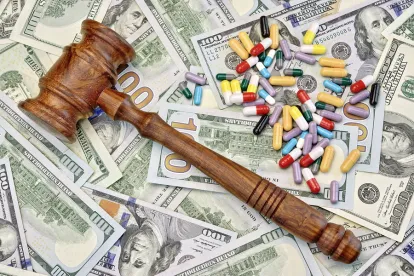Between 2005 and 2015, 78% of drugs associated with new patents were not new drugs.1 The practice of obtaining patents covering these “new inventions,” which include modifications of known drugs or new mixtures or delivery methods of known drugs, is commonly referred to as evergreening, and has become one of many tactics drug makers use to shield a product’s market exclusivity long past the product’s initial patent term and delay the entry of generic competition2 into the market. Recent moves by legislators to increase generic competition, and thereby reduce drug prices, have inspired drug makers to explore other ways to use patents to protect their investment in blockbuster brand-name products. In the case of at least one particular drug therapy, this has meant evergreening to the extreme.
Patent Thicket
In 2019, drugmaker AbbVie, manufacturer of the world’s best-selling drug treatment Humira, was accused, in a series of consolidated class actions brought by indirect purchasers of Humira, of illegally shielding Humira from generic competition with a “thicket” of more than 100 patents.3 Humira, a biologic treatment used primarily for arthritis and other autoimmune disorders, has generated more than $115 billion in global sales since 2010. Despite expiration of the primary Humira patent in December 2016, some of Humira’s other patents stretch out to 2034 — more than three decades after the drug launched. Plaintiffs allege that this excessive patent portfolio creates unlawful exclusionary effects that stifle generic competition and render normal enforcement mechanisms, such as litigating invalid patents, financially impracticable.
Efforts by prospective competitors to slash through AbbVie’s patent thicket through litigation have proven ineffective. Most recently, the last-remaining challenger, Boehringer Ingelheim, settled its claims and joined several other biosimilar manufacturers in the queue to await an agreed-upon release date in the U.S. Based on these patent settlement agreements, plaintiffs accuse AbbVie and its would-be generic rivals of entering unlawful pay-for-delay and market allocation agreements that permit AbbVie to maintain Humira’s supracompetitive prices for years to come. According to the complaint, absent competition in the U.S., the cost of treatment with Humira can cost patients $50,000 per year. A cost which, in the absence of AbbVie’s alleged agreements, should have decreased significantly with the entry of generics after expiration of the primary Humira patent. Despite the pending allegations, AbbVie started 2020 with a price increase in excess of 7% — making it among a handful of drugs with the highest jumps in the new year.4
Pay-for-Delay
The various plaintiffs allege that AbbVie and its would-be competitors engaged in pay-for-delay deals to delay the launch of competitive biosimilars. In particular, plaintiffs point to the agreement between AbbVie and competitor Amgen, which permits Amgen to enter the market earlier than any other generic. Plaintiffs contend this affords Amgen a substantial payout by being the first to reach a settlement with AbbVie. Namely, under its settlement, Amgen can launch its biosimilar in January 2023, while other competitors are excluded from the market until June that year at the earliest.
While the Supreme Court’s landmark Actavis5 decision left open the possibility that pay-for-delay agreements could be anticompetitive, plaintiffs will face multiple challenges in demonstrating AbbVie’s particular arrangements constitute pay-for-delay. While some courts have suggested that payments could be non-monetary, courts have struggled to adopt definitive standards of what constitutes a “payment.”6 Here, plaintiffs must demonstrate that the earlier biosimilar access to the EU market constitutes a large and unjustifiable payment. Moreover, under the Actavis decision, the arrangements could be scrutinized under the flexible and defendant-friendly rule of reason standard, which allows defendants to propose procompetitive justifications to overcome allegations of anticompetitive conduct. Defendants could then argue that the settlement agreement is procompetitive because it allows Amgen’s biosimilar product to come to the U.S. market years before the expiration of all of AbbVie’s asserted patents.
Market Allocation
Of the $20 billion in earnings from sales of Humira in 2018, $14 billion was reportedly generated from sales in the U.S. Following the launch of the first biosimilar in Europe, European prices for a course of treatment with Humira dropped between 10-80%.7 Anticipating a similar drop in prices in the U.S. following entry of the first biosimilar, plaintiffs allege that AbbVie conspired with its competitors to unlawfully divide the U.S. and European markets.
According to a complaint filed by New York’s largest grocery workers union, AbbVie’s agreements permit a deliberate sacrifice of profits in an already less lucrative European market to sustain astronomical prices in the U.S. This division of European and U.S. markets is per se unlawful under Section 1 of the Sherman Act as unlawful market allocation. Plaintiffs contend that the agreements between competitors to cease competing is “anticompetitive regardless of whether the parties split a market within which both do business or whether they reserve one market for one and another for the other.”8
Since the union launched these claims in March 2019, several other third parties have also filed suit, including Miami police officers, the mayor and city council in Baltimore, as well as other unions representing Minnesota and New York workers.9 While the per se nature of the claim puts plaintiffs in a somewhat easier position, some commentators remain skeptical that courts will adopt plaintiffs’ arguments. For instance, there remains a question of whether a generic defendant’s actions could be considered “ceasing to compete” in a market if its producthad not yet launched and competition had not yet begun.
AbbVie’s Response
In October 2019, in a memorandum in support of its motion to dismiss the case10, AbbVie argued that the antitrust accusations around its accumulation of patents around Humira should be dismissed because there is no law limiting the number of patents a company can hold. AbbVie further argued that its settlement agreements are early-entry-only settlements, which are not subject to antitrust scrutiny, in contrast to settlements that provide for a reverse-payment flowing from the patent holder to the licensee.
Conclusion
In the past year, bipartisan measures proposed in the U.S. Senate aim to “[curb] patent manipulation by brand name drug makers”11 and private parties similarly seek to erode barriers to generic market entry through class action lawsuits. While allegations against AbbVie are not atypical to antitrust actions in the pharmaceutical space, AbbVie’s conduct with respect to protecting Humira raises new issues surrounding drug makers’ unilateral ability to shield blockbuster therapies from generic competition. Perhaps on a scale not seen before, the Humira litigation forces courts and policymakers to confront the market consequences that coincide with the grant of patent monopolies, including the harms to competition and threats to consumer access to needed therapies.
1 Robin Feldman, May your drug price be evergreen, 5 J. OF L. & THE BIOSCIENCES 590 (2018). https://academic.oup.com/jlb/article/5/3/590/5232981
2 Reforming Evergreening and Manipulation that Extends Drug Years Act (REMEDY Act), S.___, 116th Cong. (1st Sess. 2019).
3 In re: Humira (Adalimumab) Antitrust Litig., No. 19-VC-1873 (N.D. Ill. consolidated Jun. 4, 2019); see also Jeff Overlay, ‘Groundbreaking’ AbbVie Suits Test Bold Anti-Generic Tactics, LAW360 (Mar. 27, 2019, 8:43 PM), https://www.law360.com/articles/1055075/-groundbreaking-abbvie-suits-test-bold-anti-generic-tactics
4 Christopher Rowland, Why price of Humira keeps rising despite FDA approval of generic competition, The Washington Post (Jan. 8, 2020, 7:00 AM), https://www.washingtonpost.com/ business/economy/why-humiras-price-keeps-rising-despite-fda-approval-of-genericcompetition/2020/01/07/549ed0ce-2e3a-11ea-bcb3-ac6482c4a92f_story.html.
5 Fed. Trade Comm’n v. Actavis, Inc., et al., 133 S. Ct. 2223 (2013).
6 See, e.g., In re Loestrin 24 Fe Antitrust Litig., 45 F.3d 538, 549 (1st Cir. 2016) (overturning a district court decision only Actavis applies “only to cash settlements or to their very close analogues” and expanding Actavis’ holding to noncash forms of settlement payments).
7 Sarah Jane Tribble, Why the U.S. Remains the Most Expensive Market for ‘Biologic’ Drugs in the World, NPR (Dec. 19, 2018, 1:02 PM), https://www.npr.org/sections/health-shots/2018/12/19/ 676401634/why-the-u-s-remains-the-most-expensive-market-for-biologic-drugs-in-the-world.
8 Complaint at 36-37, UFCW Local 1500 Welfare Fund v. AbbVie Inc., et al., No. 19-CV-01873 (N.D. Ill. filed Mar. 18, 2019) (citing Palmer v. BRG of Ga., Inc., 498 U.S. 46, 49-50 (1990)).
9 Eric Sagonowsky, AbbVie’s Humira antitrust woes snowball as class-action plaintiffs pile in, FIERCEPHARMA (Apr. 3, 2019, 12:16 PM), https://www.fiercepharma.com/pharma/police-miamicity-officials-baltimore-and-trade-workers-minnesota-join-class-action-over.
10 Memorandum in Support of Defendants’ Motion to Dismiss, In re: Humira (Adalimumab) Antitrust Litigation, No. 19-CV-1873 (N.D.Ill. filed October 10, 2019).
11 Press Release, Bill Cassidy, M.D., Cassidy Introduces Package of Legislation to Lower Drug Prices (Apr. 11, 2019), https://www.cassidy.senate.gov/newsroom/press-releases/cassidy-introducespackage-of-legislation-to-lower-drug-prices.





 />i
/>i

